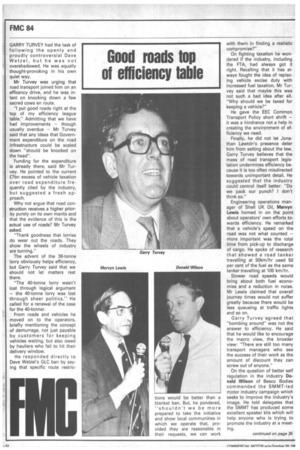Good roads top of efficiency table
Page 34

If you've noticed an error in this article please click here to report it so we can fix it.
GARRY TURVEY had the task of following the openly and proudly controversial Dave Wetzel, but he was not overshadowed. He was equally thought-provoking in his own quiet way.
Mr Turvey was urging that road transport joined him on an efficency drive, and he was intent on knocking down a few sacred cows en route.
"I put good roads right at the top of my efficiency league table." Admitting that we have had improvements — though usually overdue — Mr Turvey said that any ideas that Government expenditure on the road infrastructure could be scaled down "should be knocked on the head".
Funding for the expenditure is already there, said Mr Turvey. He pointed to the current E7bn excess of vehicle taxation over road expenditure frequently cited by the industry, but suggested a fresh approach.
Why not argue that road construction receives a higher priority purely on its own merits and that the evidence of this is the actual use of roads? Mr Turvey asked.
-Thank goodness that lorries do wear out the roads. They show the wheels of industry are turning."
The advent of the 36-tonne lorry obviously helps efficiency, but Garry Turvey said that we should not let matters rest there.
"The 40-tonne lorry wasn't lost through logical argument — the 40-tonne lorry was lost through sheer politics." He called for a renewal of the case for the 40-tanner.
From roads and vehicles he moved on to the operators, briefly mentioning the concept of demurrage, not just payable by customers for keeping vehicles waiting, but also owed by hauliers who fail to hit their delivery window.
He responded directly to Dave Wetzel's GLC ban by saying that specific route restric tions would be better than a blanket ban. But, he pondered, "shouldn't we be more prepared to take the initiative and show local communities in which we operate that, provided they are reasonable in their requests, we can work with them in finding a realistic compromise?"
On fighting taxation he wondered if the industry, including the ETA, had always got it right. Recalling that it has always fought the idea of replacing vehicle excise duty with increased fuel taxation, Mr Turvey said that maybe this was not such a bad idea after all. "Why should we be taxed for keeping a vehicle?"
He gave the EEC Common Transport Policy short shrift — it was a hindrance not a help in creating the environment of efficiency we need.
Finally, he did not let Jonathan Lawkin's presence deter him from setting about the law. Garry Turvey believes that the mass of road transport legislation undermines efficiency because it is too often misdirected towards unimportant detail. He suggested that the industry could control itself better: "Do we pack our punch? I don't think so."
Engineering operations manager of Shell UK Oil, Mervyn Lewis homed in on the point about operators' own efforts towards efficiency. He remarked that a vehicle's speed on the road was not what counted — more important was the total time from pick-up to discharge of cargo. He spoke of research that showed a road tanker travelling at 50km/hr used 50 per cent of the fuel as the same tanker travelling at 100 km/hr.
Slower road speeds would bring about both fuel economies and a reduction in noise. Mr Lewis claimed that overall journey times would not suffer greatly because there would be less queueing at traffic lights and so on.
Garry Turvey agreed that "bombing around" was not the answer to efficiency. He said that he would like to encourage the macro view, the broader view: "There are still too many transport managers who see the success of their work as the amount of discount they can screw out of anyone."
On the question of better self regulation in the industry Donald Wilson of Besco Bodies commended the SMMT-led motor industry campaign which seeks to improve the industry's image. He told delegates that the SMMT has produced some excellent speaker kits which will help anyone who is trying to promote the industry at a meeting.
































































































































































































































